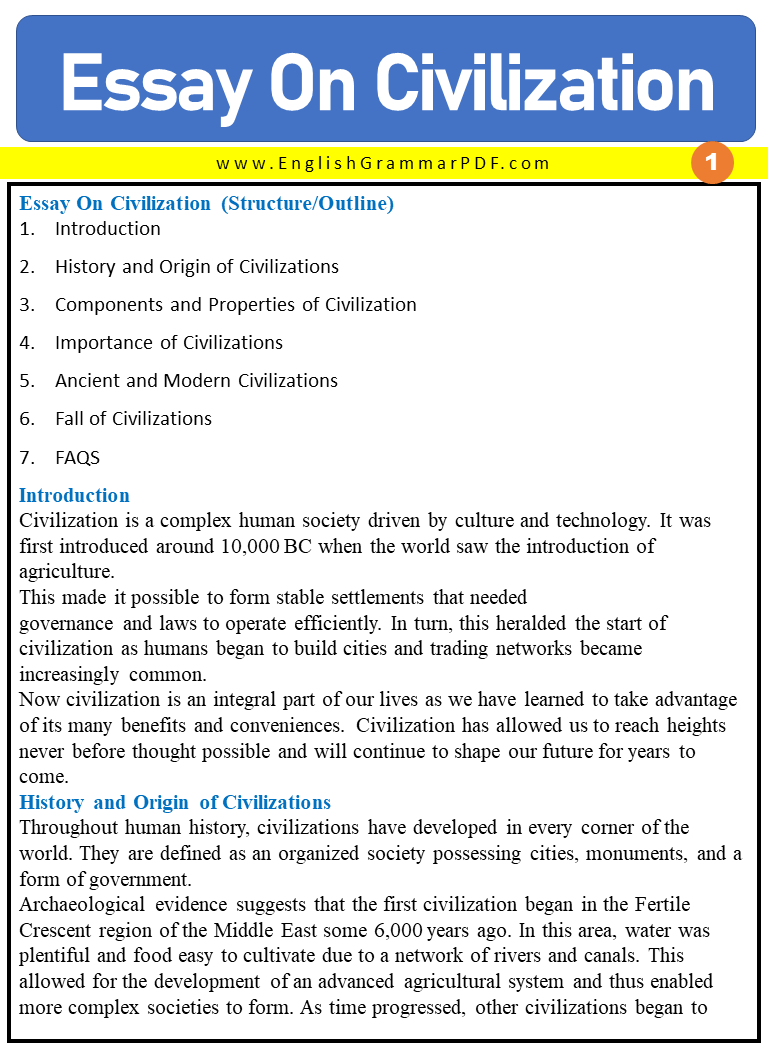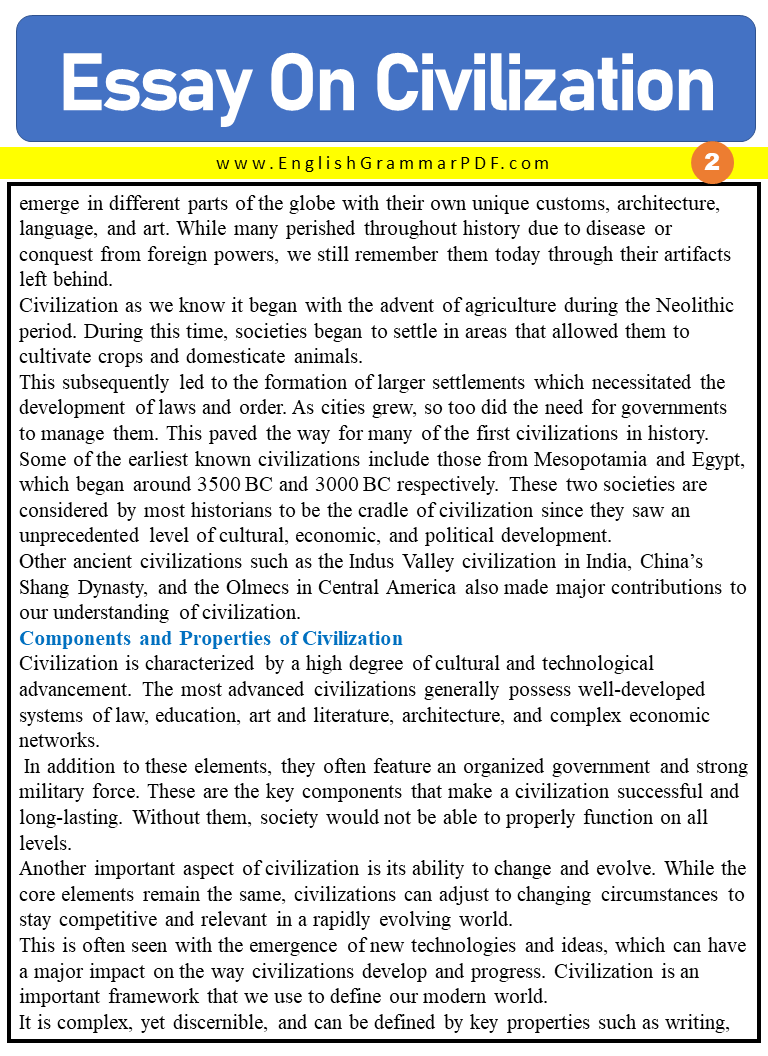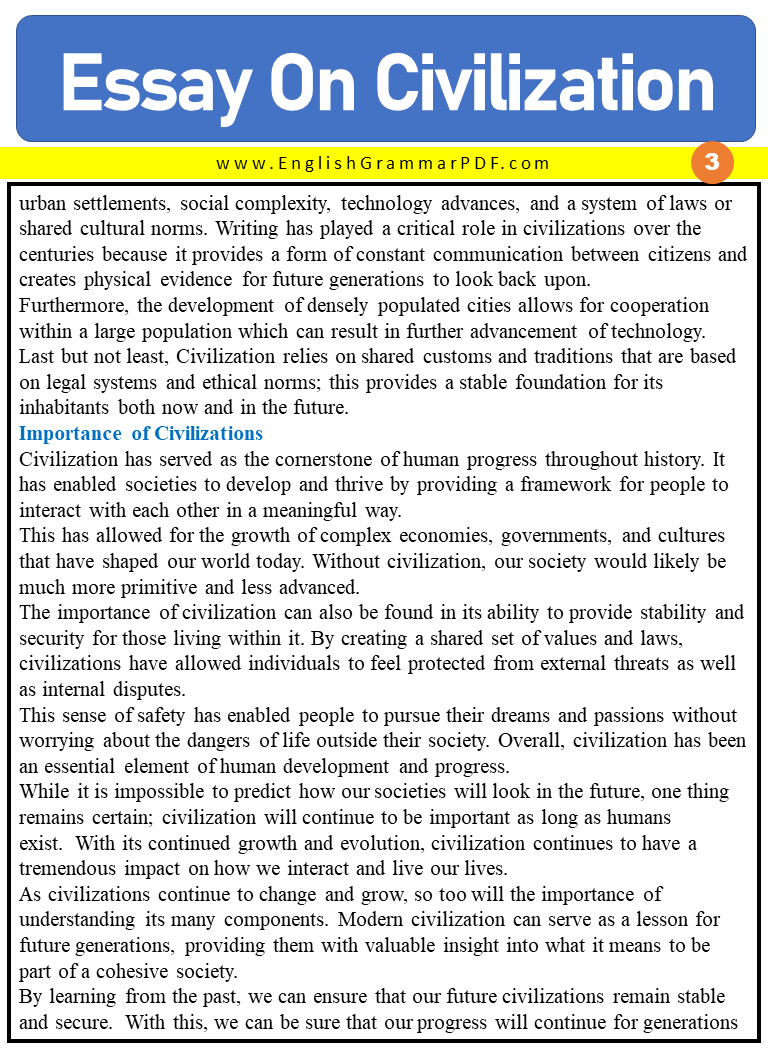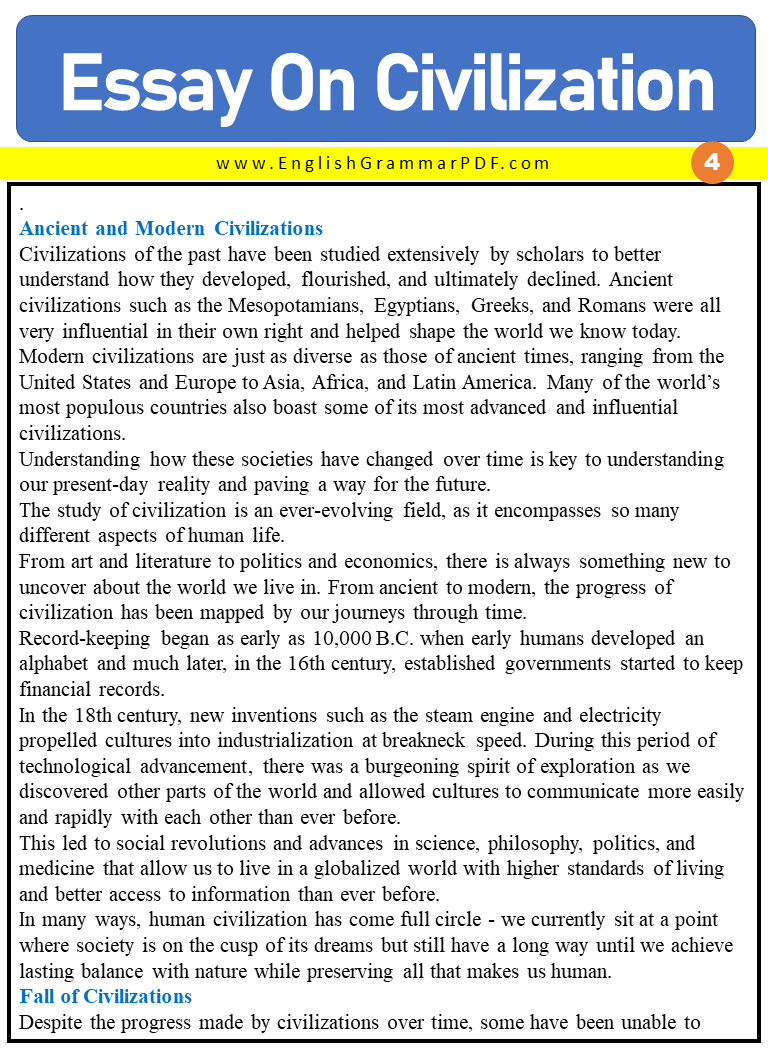Essay On Civilization (Structure/Outline)
- Introduction
- History and Origin of Civilizations
- Components and Properties of Civilization
- Importance of Civilizations
- Ancient and Modern Civilizations
- Fall of Civilizations
- FAQS

Introduction
Civilization is a complex human society driven by culture and technology. It was first introduced around 10,000 BC when the world saw the introduction of agriculture.
This made it possible to form stable settlements that needed
governance and laws to operate efficiently. In turn, this heralded the start of civilization as humans began to build cities and trading networks became increasingly common.
Now civilization is an integral part of our lives as we have learned to take advantage of its many benefits and conveniences. Civilization has allowed us to reach heights never before thought possible and will continue to shape our future for years to come.
History and Origin of Civilizations
Throughout human history, civilizations have developed in every corner of the world. They are defined as an organized society possessing cities, monuments, and a form of government.
Archaeological evidence suggests that the first civilization began in the Fertile Crescent region of the Middle East some 6,000 years ago. In this area, water was plentiful and food easy to cultivate due to a network of rivers and canals. This allowed for the development of an advanced agricultural system and thus enabled more complex societies to form. As time progressed, other civilizations began to emerge in different parts of the globe with their own unique customs, architecture, language, and art. While many perished throughout history due to disease or conquest from foreign powers, we still remember them today through their artifacts left behind.
Civilization as we know it began with the advent of agriculture during the Neolithic period. During this time, societies began to settle in areas that allowed them to cultivate crops and domesticate animals.
This subsequently led to the formation of larger settlements which necessitated the development of laws and order. As cities grew, so too did the need for governments to manage them. This paved the way for many of the first civilizations in history.
Some of the earliest known civilizations include those from Mesopotamia and Egypt, which began around 3500 BC and 3000 BC respectively. These two societies are considered by most historians to be the cradle of civilization since they saw an unprecedented level of cultural, economic, and political development.
Other ancient civilizations such as the Indus Valley civilization in India, China’s Shang Dynasty, and the Olmecs in Central America also made major contributions to our understanding of civilization.
Components and Properties of Civilization
Civilization is characterized by a high degree of cultural and technological advancement. The most advanced civilizations generally possess well-developed systems of law, education, art and literature, architecture, and complex economic networks.
In addition to these elements, they often feature an organized government and strong military force. These are the key components that make a civilization successful and long-lasting. Without them, society would not be able to properly function on all levels.
Another important aspect of civilization is its ability to change and evolve. While the core elements remain the same, civilizations can adjust to changing circumstances to stay competitive and relevant in a rapidly evolving world.
This is often seen with the emergence of new technologies and ideas, which can have a major impact on the way civilizations develop and progress. Civilization is an important framework that we use to define our modern world.
It is complex, yet discernible, and can be defined by key properties such as writing, urban settlements, social complexity, technology advances, and a system of laws or shared cultural norms. Writing has played a critical role in civilizations over the centuries because it provides a form of constant communication between citizens and creates physical evidence for future generations to look back upon.
Furthermore, the development of densely populated cities allows for cooperation within a large population which can result in further advancement of technology. Last but not least, Civilization relies on shared customs and traditions that are based on legal systems and ethical norms; this provides a stable foundation for its inhabitants both now and in the future.
Importance of Civilizations
Civilization has served as the cornerstone of human progress throughout history. It has enabled societies to develop and thrive by providing a framework for people to interact with each other in a meaningful way.
This has allowed for the growth of complex economies, governments, and cultures that have shaped our world today. Without civilization, our society would likely be much more primitive and less advanced.
The importance of civilization can also be found in its ability to provide stability and security for those living within it. By creating a shared set of values and laws, civilizations have allowed individuals to feel protected from external threats as well as internal disputes.
This sense of safety has enabled people to pursue their dreams and passions without worrying about the dangers of life outside their society. Overall, civilization has been an essential element of human development and progress.
While it is impossible to predict how our societies will look in the future, one thing remains certain; civilization will continue to be important as long as humans exist. With its continued growth and evolution, civilization continues to have a tremendous impact on how we interact and live our lives.
As civilizations continue to change and grow, so too will the importance of understanding its many components. Modern civilization can serve as a lesson for future generations, providing them with valuable insight into what it means to be part of a cohesive society.
By learning from the past, we can ensure that our future civilizations remain stable and secure. With this, we can be sure that our progress will continue for generations to come.
Ancient and Modern Civilizations
Civilizations of the past have been studied extensively by scholars to better understand how they developed, flourished, and ultimately declined. Ancient civilizations such as the Mesopotamians, Egyptians, Greeks, and Romans were all very influential in their own right and helped shape the world we know today.
Modern civilizations are just as diverse as those of ancient times, ranging from the United States and Europe to Asia, Africa, and Latin America. Many of the world’s most populous countries also boast some of its most advanced and influential civilizations.
Understanding how these societies have changed over time is key to understanding our present-day reality and paving a way for the future.
The study of civilization is an ever-evolving field, as it encompasses so many different aspects of human life.
From art and literature to politics and economics, there is always something new to uncover about the world we live in. From ancient to modern, the progress of civilization has been mapped by our journeys through time.
Record-keeping began as early as 10,000 B.C. when early humans developed an alphabet and much later, in the 16th century, established governments started to keep financial records.
In the 18th century, new inventions such as the steam engine and electricity propelled cultures into industrialization at breakneck speed. During this period of technological advancement, there was a burgeoning spirit of exploration as we discovered other parts of the world and allowed cultures to communicate more easily and rapidly with each other than ever before.
This led to social revolutions and advances in science, philosophy, politics, and medicine that allow us to live in a globalized world with higher standards of living and better access to information than ever before.
In many ways, human civilization has come full circle – we currently sit at a point where society is on the cusp of its dreams but still have a long way until we achieve lasting balance with nature while preserving all that makes us human.
Fall of Civilizations
Despite the progress made by civilizations over time, some have been unable to withstand the forces of nature or achieve a lasting balance with their environment. These cases are referred to as “civilizational collapse” and can result from environmental degradation, depletion of resources, military defeat, social unrest, or any combination thereof.
The fall of entire civilizations can have devastating consequences for their inhabitants and the surrounding region, so understanding the causes of collapse is important to prevent it from happening again.
The fall of civilizations can be attributed to a variety of factors, but often environmental stressors are a major cause. This can include deforestation, overpopulation, or climate change, which put a strain on resources that could otherwise have sustained their societies.
Other times, civilizations are simply too large and complex to survive the political or economic pressures that come with running a large state. In these cases, fragmented leadership, over-dependence on external resources, and unequal power between classes can lead to civil unrest and eventual collapse.
FAQS
What is civilized society?
Civilized society is a term that broadly refers to the way people interact and organize themselves in a structured and orderly way. This typically involves having clear laws, rules, and standards of behavior that are enforced by a governing body.
Why is civilization important?
Civilization is important because it allows us to form complex societies and progress as a species. It also allows us to develop our technologies, create art and literature, share ideas, and make advancements.
What are the fundamentals of a civilization?
The fundamentals of a civilization include but are not limited to a writing system, social structure, laws and government, art and literature, trade and economy, as well as innovations in technology.
How many types of Civilizations are there?
There are four main types of civilizations: hunter-gather, agricultural, industrial, and post-industrial. Each type is distinguished by its level of advancement in terms of technology, government systems, economics, and social structure.
What are the consequences of civilizational collapse?
The consequences of civilizational collapse can range from environmental degradation to famine and social disorder. In extreme cases, it can even lead to the complete abandonment of a region or territory.
Essay On Civilization (Pictures & PDF)





Related: Essay on Clouds
Below is the PDF of this Essay.


